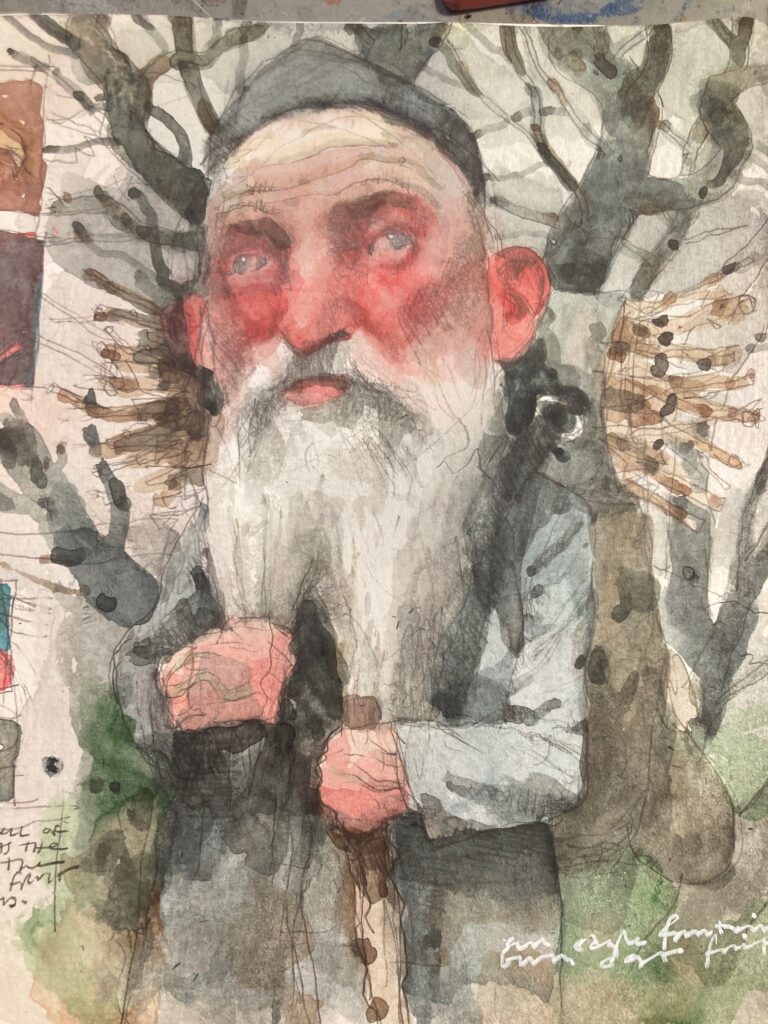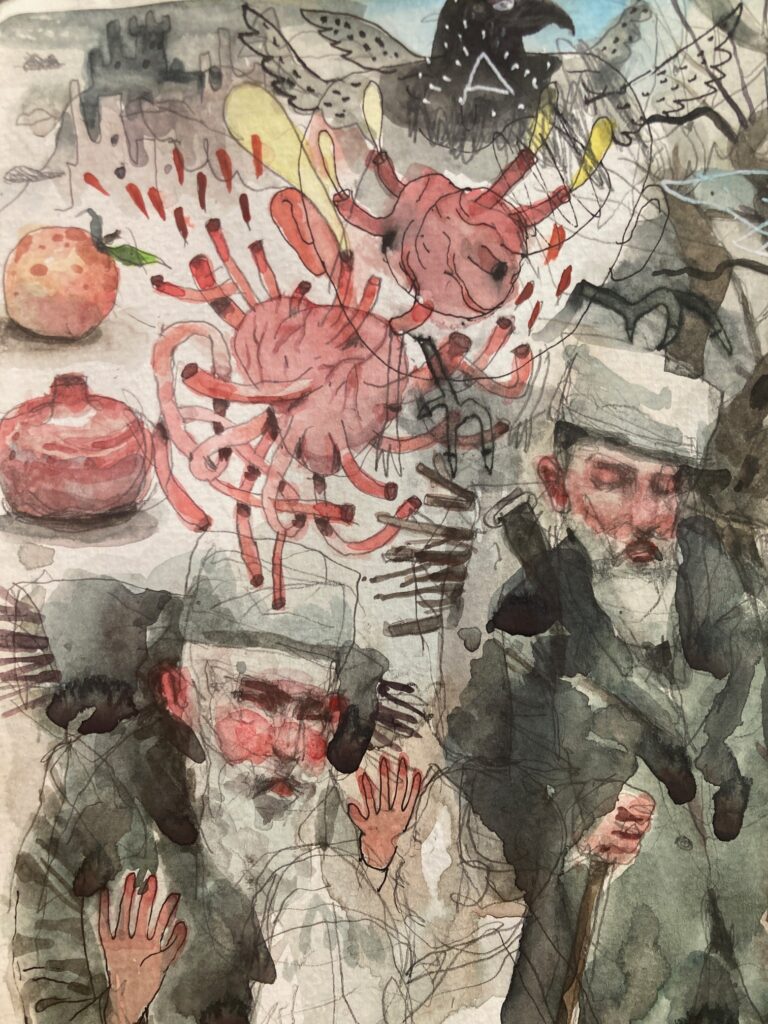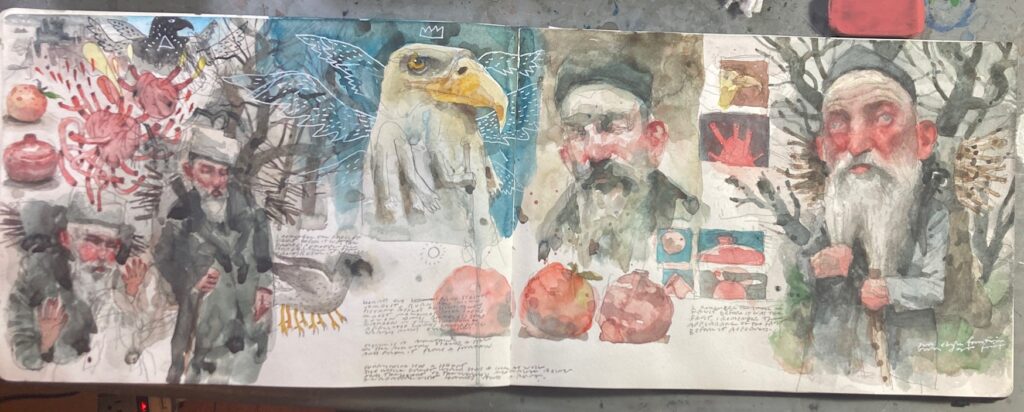The Tale of the Seven Beggars Part Three
On the third day of the wedding celebration, the bride and groom remembered the third beggar and longed for him so strongly that they wept. They said, “If only the stammering beggar were here with us as well!”
With a cry of “Here I am!” he appeared. They embraced and kissed each other, and the beggar said,

Once I blessed you, saying, may you grow up to be just like me. Now I give that blessing to you outright, as a wedding present.
You think I stammer? Far from it! I only seem to stammer because I hesitate to utter merely worldly words, to speak anything that isn’t in praise of the Most High. Any other utterance is too lacking in perfection.
I have no speech defect at all, I speak beautifully, eloquently. I have oratorical powers that would astonish you. I can recite riddles and poems and even sing songs. When I begin to speak, there isn’t a created thing that wouldn’t wish to listen, for these riddles, poems, and songs contain all the wisdom there is. I have an affidavit attesting this from the great man whose name is Truly Kind.
Once upon a time all the wisest men sat together bragging, each one claiming to be the greatest sage. One of them boasted he’d discovered iron, that is, how to smelt it from ore. Another bragged how he’d discovered some other metal, tin or lead, it isn’t important which. Another claimed the same regarding silver, which was, he pointed out, much more valuable. Someone else had discovered gold. This one had been the first to make implements of war, pistols and cannons and the like. That one had discovered how to make metal implements out of substances other than metals. Another had discovered chemistry and physics, which had brought about such refinements as the manufacture of explosives and projectiles.
While all of them were shouting about what they’d accomplished, one cried out “I am wiser than the lot of you, for I am wise as a whole day, while all of your skills and sciences, taken together, would only amount to an hour!”
The reasoning behind this claim was as follows. Every science is related to the day of creation on which the object of that science was made.
Sciences don’t make or originate things. All they do is bring together and analyze various things made on the different days of creation, and this is how they are able to “make” silver or copper or whatever, with all their alloys and degrees of purity. But taking into account all the distinct elements every science concerns itself with and how they relate to specific hours on the various days of creation, all the times involved would only amount to one hour per science. That’s how much of reality the sciences really understand.
Now this last person had said his science comprised an entire day’s worth of wisdom.
So I (the stammering beggar) said to him, An entire day. And which day is that?
He said, This fellow here is even smarter than me, because he thinks to ask which day. But my answer is, whichever day you please!
How was I, who asked which day, cleverer than he? To understand that you need to hear the whole story.
The Truly Kind Man is a great man indeed, and I go around the world collecting acts of true kindness, which I bring to the Truly Kind Man.
The principle of time—the necessary and sufficient cause that time exists at all—the reason we have days and years here in the physical world—is for the sake of acts of true kindness. That’s how the Holy One ordained existence.
I gather all acts of true kindness and bring them to the Truly Kind Man.
There is somewhere a mountain,
on the mountain stands a stone,
and from it flows a fountain.
Everything has a heart,
the whole great world has a heart as well,
and heart of the world is a complete being,
a creature with hands and feet,
and the mere toenail of the heart of the world
has more feeling than any other creature’s heart.
The world’s heart stands
on the opposite side of the world,
facing the fountain,
longing, terribly, forever,
pining to get to that faraway fountain.
So brutal is its craving that it must cry out
to the fountain, which longs no less for the heart.
Now the heart suffers much from two heavy things:
from without, the sun’s cruel beams hunt it,
from within, its passion is a dire heat.
But when the heart can bear it no more
a great bird comes and hovers
to cover the heart from the sun
with its great wide wings.
The heart can rest for a moment, but even then
it never stops looking towards,
longing for, the fountain.

So, why doesn’t the heart just go to the fountain? As soon as the heart approaches the mountain with the fountain on top, it is no longer able to see the peak where the fountain is, which causes it an agony—a death agony. For the heart’s life depends on the fountain.
That’s how it is with mountains. From a distance you can see the summit, but you lose sight of it when you approach.
If the heart were deprived of the sight of the fountain for any length of time, it would, God forbid, die, and then the whole world would be destroyed, for the heart of the world maintains the existence of the world and everything in it.
So the heart can never reach the fountain, it always stands far off and cries out for it.
Now the fountain has no time, because the fountain doesn’t exist in time, so sunrise and sunset, seasons and years, don’t exist for it. The fountain is on a higher plane of being. How can the heart of the world even see something beyond time and space?
Though the fountain itself is not involved in time, it’s allowed as much time as the heart gives it, as a present, a day at a time. When that day is ending the fountain’s allotment of time runs out, it starts to leave—and that would be the end of the heart and the whole world, God forbid.
When the day begins to end, the fountain and the heart begin to sing to one another, musical poems and riddles, the most wonderful songs that are, passionate, poignant, impossible songs. Then Truly Kind Man, who watches over them, gives another day to the heart, which it gives to the fountain, and they’re saved for one more day.
And every day that arrives from wherever it is days come from, brings its own musical poems and riddles, and in them is hidden all the wisdom in the world. Not every day’s songs are the same; there are Sundays and Mondays and so on, the day when the lunar month begins, holidays. Every day has its own poetic liturgy.
And the days the Truly Kind Man has he gets from me (the stuttering beggar who tells this story). I go through the world collecting all the really kind actions, and these are what justify, what make possible, the existence of time.
And this is why I who stutter am even more clever than the man who’s as wise as whatever day you please—I make possible the continuation of time itself, with its various days and all the wisdom they contain.
And I have an affidavit to this effect from the Truly Kind Man, that I can actually speak astonishingly well, and this is my wedding gift to you, that you will be like me.
Everyone rejoiced and great was the celebration on that day.
